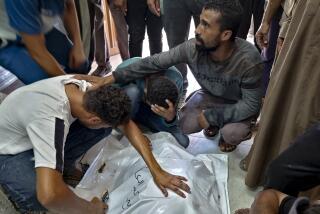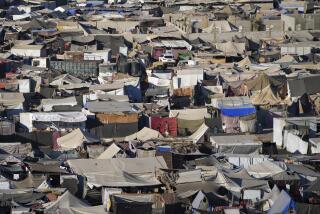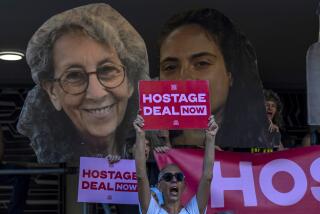Israeli-Hamas clash sends unsettling ripples throughout Mideast
A weeklong battle between Israel and Hamas militants in the Gaza Strip has turned the political kaleidoscope, shaking up and repositioning diplomatic forces tackling the Middle East’s myriad conflicts.
The broad alliance contending with the civil war in Syria has divided over who’s to blame for the latest Israeli-Palestinian clash. Egypt, no longer moving in lockstep with Washington after last year’s ouster of President Hosni Mubarak, is walking a fine line between defense of fellow Islamists in Hamas and commitment to the Arab-Israeli peace treaty. Tensions in Egypt’s Sinai have ratcheted up with an influx of Palestinians fleeing the airstrikes on Gaza. And what was seen for months as a grave threat for the region -- Israel’s vow to bomb Iranian nuclear facilities -- has faded from the headlines but not the horizon.
The barrage of Hamas rockets and Israeli airstrikes has most notably diverted world powers’ attention from the rebellion against Syrian President Bashar Assad that has reached a bloody stalemate after 20 months and left thousands dead. The U.N. Security Council called an emergency session in New York for Wednesday. U.S. Secretary of State Hillary Rodham Clinton has rushed to the region to counsel the Gaza combatants, as has U.N. Secretary-General Ban Ki-moon and concerned diplomats from the European Union and Arab League.
TIMELINE: Israel-Gaza conflict
Even if the Gaza conflict is quickly tamped down by a cease-fire, it has undermined the recent consensus among Western powers to unite rebel groups fighting for Assad’s ouster and strengthen their hand with diplomatic recognition, aid and potentially arms. Turkey, a NATO military partner and staunch U.S. ally in the Syria peace efforts, has accused leaders of the Jewish state of “waging terrorism” against Palestinians in Hamas-ruled Gaza.
Egypt’s new Islamist leadership has also come to the defense of Hamas, an offspring of the Muslim Brotherhood that helped bring President Mohamed Morsi to power this year and transform Cairo’s political outlook after three decades of Mubarak toeing the U.S. line.
Morsi has so far shown balance and statesmanship in helping to broker a cease-fire, analysts say, but the shifts in popular sentiment brought about by the “Arab Spring” confront the Egyptian leader with competing pressures to respect the peace accord with Israel as well as stand up for the Palestinians who have suffered the lion’s share of casualties in the weeklong conflict. As of late Tuesday, the Palestinian death toll topped 130 and the Israeli toll was five dead.
Middle East experts are divided over the significance of Israel’s sudden silence on Tehran’s reported acceleration of uranium enrichment and suspected aim of building a nuclear bomb. Some contend Israel couldn’t cope with a two-front war and has put the standoff with Tehran on a back burner. Others expect the Israelis to confront any fresh Iranian provocation even while battling Hamas, with the recent clash providing them an opportunity to test their Iron Dome missile defense system.
“A lot of people have speculated that this is a sort of dress rehearsal for Iran,” Paul Scham, a Middle East Institute scholar and professor of Israel studies at the University of Maryland, said of the past week’s Israeli offensive punishing an escalation of Hamas rocket fire into southern Israel.
The Iron Dome system succeeded in intercepting at least 300 rockets fired from Gaza, preventing what might have been a higher civilian casualty toll that could have driven Israel to step up its offensive with a ground invasion, Scham noted.
Demonstrating the prowess of its previously untested missile defense, he said, “might be a warning to Iran, and to the United States as well, that Israel is serious about halting any weapons development.”
Charles Ries, a career diplomat now heading Rand Corp.’s Center for Middle East Public Policy, said he wasn’t among those predicting that an Israeli strike on Iran was imminent. But he sees no compromising of Israeli capabilities to act against Tehran because of the Gaza distraction.
“The Israelis will act on their interests as they see them. If they see weaponization by Iran, they will act regardless of Gaza. That said, I don’t think that’s particularly likely,” Ries said of the Iranian nuclear standoff surging to the foreground.
A more disturbing consequence of the past week’s violence may be seen in Syria, where attacks on rebel-held civilian enclaves by Assad’s forces have intensified as the Syrian president takes advantage of the international community’s diverted attention, said Robert Danin, senior fellow in Middle East and African Studies at the Council on Foreign Relations.
“We’ve seen a dramatic uptick in violence in Syria since this conflict broke out in Gaza,” said Danin. “We are not very good, the United States or the international community, at watching multiple crises unfolding. This conflict has a way of sucking oxygen away from other issues.”
ALSO:
Congo rebels occupy key city of Goma
Argentina strikes paralyze capital, other cities
Church of England votes against having female bishops
A foreign correspondent for 25 years, Carol J. Williams traveled to and reported from more than 80 countries in Europe, Asia, the Middle East and Latin America.
More to Read
Sign up for Essential California
The most important California stories and recommendations in your inbox every morning.
You may occasionally receive promotional content from the Los Angeles Times.











